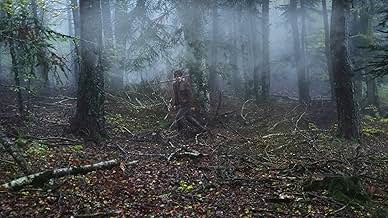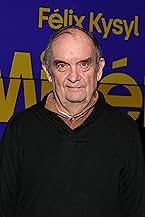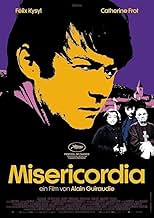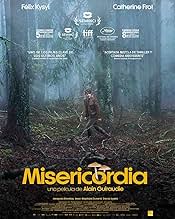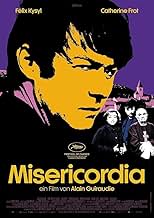Miséricorde
De retour à Saint-Martial pour les funérailles de son défunt patron, Jérémie se retrouve chez la veuve Martine, mêlée à une disparition, une voisine menaçante et les intentions louches d'un ... Tout lireDe retour à Saint-Martial pour les funérailles de son défunt patron, Jérémie se retrouve chez la veuve Martine, mêlée à une disparition, une voisine menaçante et les intentions louches d'un abbé.De retour à Saint-Martial pour les funérailles de son défunt patron, Jérémie se retrouve chez la veuve Martine, mêlée à une disparition, une voisine menaçante et les intentions louches d'un abbé.
- Réalisation
- Scénario
- Casting principal
- Récompenses
- 4 victoires et 20 nominations au total
Luis Serrat
- Petit rôle
- (as Lluis Serrat)
Avis à la une
I very much enjoyed this gentle tale of intrigue and murder most foul. It really reminded me of the world of Twin Peaks, where nothing is really what it seems and you can't be sure of who anyone is or why they do what they do. There are so many unspoken elements of the production, that you're still guessing about elements of the story when the curtain closes.
However, that to me in a movie isn't necessarily a problem because not everything in life is neat and tidy anyway. There is some great acting and lovely cinematography and a nice seam of rich dark humour running through the affair. Slow paced but no less good for that.
However, that to me in a movie isn't necessarily a problem because not everything in life is neat and tidy anyway. There is some great acting and lovely cinematography and a nice seam of rich dark humour running through the affair. Slow paced but no less good for that.
Well, when there is death of a loved one, we don't want that to be a permanent loss. Each main character here carries a kind of loss with them. Human nature compels us to maintain hope; hope that there could be something more, eventually. Perhaps not a replacement of that person, exactly, but a kind of consolation. That's essentially what this movie is about, I feel, and each character searches for this consolation in their own, sometimes weird, ways. I can appreciate the humanity at work here.
Where the movie is lacking, for me, is Jeremy's backstory. Oddly, even though the movie is centred on Jeremy, we never really learn THAT much about him. On a practical level: how is he able to be unemployed for so long? On a deeper level: why is he doing what he is doing, exactly? Why is he behaving in this clingy way, never wanting to leave this house? Why did he love his former boss; how did that strong connection come to be? These questions are never really answered because there is little context/background here.
Also... do cops not need warrants in France? I'm no expert on the French legal system but it stretched believability for me that cops can just barge into a house like that, displaying no warrant, to interrogate Jeremy. Odd. But there are quite a few odd things in this odd little film. I don't necessarily mind that.
Where the movie is lacking, for me, is Jeremy's backstory. Oddly, even though the movie is centred on Jeremy, we never really learn THAT much about him. On a practical level: how is he able to be unemployed for so long? On a deeper level: why is he doing what he is doing, exactly? Why is he behaving in this clingy way, never wanting to leave this house? Why did he love his former boss; how did that strong connection come to be? These questions are never really answered because there is little context/background here.
Also... do cops not need warrants in France? I'm no expert on the French legal system but it stretched believability for me that cops can just barge into a house like that, displaying no warrant, to interrogate Jeremy. Odd. But there are quite a few odd things in this odd little film. I don't necessarily mind that.
It wasn't until after I saw Misericorida that I looked up and found out that the director, Alain Guiraudie, also directed Stranger by the Lake. That was a very good film, principally since in many ways it had a much more compact theme and storyline than Misericorida.
What I found muddled about the film was the introduction of Félix Kysyl as the protagonist Jérémie Pastor. He comes back to town for the funeral of his old boss, yet it's never made clear when and why he and his family lived in the town and why they left. And then there is the whole gayness of what is - or isn't - going on. Some times it's subtle, some times very overt, especially towards the end. And here again, it is confuse about whether Jérémie is or isn't gay. Finally, there is the whole matter of Jérémie's intention - or not - to stay in town after the funeral. Yet, this of course is the underlying tension in the film. Along the way there are some eye rolling plot elements that you just have to look past.
With all that, the story moves along being alternately suspenseful, humorous and even sad. Kysyl is great as the lead. Then there is Catherine Frot as Martine, the grieving widow, and Jacques Develay as the village priest who both give great performances. And the scenery is specatular, making you want to go to France to be in the stunning countryside.
Overall, a good film that is not by the numbers yet also is not without its flaws.
What I found muddled about the film was the introduction of Félix Kysyl as the protagonist Jérémie Pastor. He comes back to town for the funeral of his old boss, yet it's never made clear when and why he and his family lived in the town and why they left. And then there is the whole gayness of what is - or isn't - going on. Some times it's subtle, some times very overt, especially towards the end. And here again, it is confuse about whether Jérémie is or isn't gay. Finally, there is the whole matter of Jérémie's intention - or not - to stay in town after the funeral. Yet, this of course is the underlying tension in the film. Along the way there are some eye rolling plot elements that you just have to look past.
With all that, the story moves along being alternately suspenseful, humorous and even sad. Kysyl is great as the lead. Then there is Catherine Frot as Martine, the grieving widow, and Jacques Develay as the village priest who both give great performances. And the scenery is specatular, making you want to go to France to be in the stunning countryside.
Overall, a good film that is not by the numbers yet also is not without its flaws.
French film industry is very profilic and rather effective in terms of such countryside dramas, taking place in remote villages. Nothing to do with the urban life. Good atmosphere, anyway far more intersting than the story itself, where you wonder where it drives to. Unusual character symphony, far from clichés. I won't say any harm about this film, it is a small film for which the director have perhaps worked during many years. It's worth the watch for those in search of petty French dramas, rapidly forgotten dramas. They have their peculiarity, their charm. We can't deny it, can we? Except Catherine Frot, I don't know the cast. But this movie delivers something disturbing, against moral and right thinking. Not for all audiences.
The film's qualities are manifold. A script whose progression we never guess at, which keeps the viewer curious, imagining certain developments, some of which never come to pass. Subtle acting direction. Photography and sets that accentuate the drama. The absence of music, which lends permanent weight to all the images. The documentary element on mushrooms. Themes centered on the relationship between the characters: girlfriend, unrequited love, parent-child relationship, homoeroticism, but also humor bordering on parody and the ridiculous.
We understand that Guiraudie must admire Pier Paolo Pasolini's Théorème (1967), not for the universe, the bourgeoisie and the abstraction, but for the homoerotic possibilities. That said, we're not bored with Miséricorde.
Flaws: no empathy for the characters. We follow their evolution through the dramatic arc, but we're not concerned by what happens to them. The parish priest's dialogues at the end take the film away from naturalism and into the realm of the ridiculous or even Z-series, unless it's deliberate humor. But in the end, this is what makes the film so interesting: its constant navigation on the edge of the abyss of indecision and even ridicule, without falling into it.
We understand that Guiraudie must admire Pier Paolo Pasolini's Théorème (1967), not for the universe, the bourgeoisie and the abstraction, but for the homoerotic possibilities. That said, we're not bored with Miséricorde.
Flaws: no empathy for the characters. We follow their evolution through the dramatic arc, but we're not concerned by what happens to them. The parish priest's dialogues at the end take the film away from naturalism and into the realm of the ridiculous or even Z-series, unless it's deliberate humor. But in the end, this is what makes the film so interesting: its constant navigation on the edge of the abyss of indecision and even ridicule, without falling into it.
Le saviez-vous
- AnecdotesPlaced at No1 in Cahiers du Cinéma's top 10 list for 2024.
Meilleurs choix
Connectez-vous pour évaluer et suivre la liste de favoris afin de recevoir des recommandations personnalisées
Détails
- Date de sortie
- Pays d’origine
- Langue
- Aussi connu sous le nom de
- Misericordia
- Lieux de tournage
- Sauclières, Aveyron, Occitania, France(Saint-Martial)
- Sociétés de production
- Voir plus de crédits d'entreprise sur IMDbPro
Box-office
- Montant brut aux États-Unis et au Canada
- 181 451 $US
- Week-end de sortie aux États-Unis et au Canada
- 23 405 $US
- 23 mars 2025
- Montant brut mondial
- 1 838 157 $US
- Durée1 heure 44 minutes
- Couleur
- Mixage
- Rapport de forme
- 2.35 : 1
Contribuer à cette page
Suggérer une modification ou ajouter du contenu manquant


